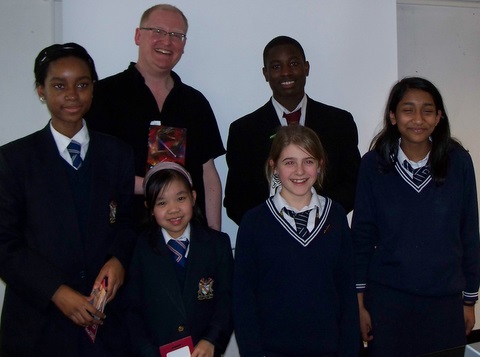
The picture above shows a team of students from Habershers’ Aske's Knights Academy secondary school. in Lewisham. They are involved in voting for the best book in a shortlist of 6, one of which is mine, in all the secondary schools in Lewisham, south London.
I met them a month ago when I was invited to the school, and their presentation has been judged the best in a competition run at a local library.
I’m not surprised. I was totally impresesd by this school. Run by a charity that took over a failing state school, it has been turned around, keeping the same students and teachers, in just two years, to achieve outstanding results.
The new school building, while seeming corporate, is conducive to focussed learning. Boys and girls are taught separately. There is a fantastic sports hall also available to the people on the surrounding council estate.
When I asked the English teacher who was my contact there what the secret of its success was, she said it was the fact that the new headmistress was always available, always popping in and out of classrooms, and not tucked away in an office.
The staff felt there was always back-up when they needed it and the kids seemed to have a very positive attitude that I know only comes when they are taken seriously. The head’s philosophy is that ALL children inately want to learn and the staff’s job is to facilitate this.
Why can’t all schools be like this? Good luck to them all!
 The literature 'zine 'Neonbeam' has published in its latest issue (4) a long interview with me. It's full of all kinds of highly revealing stuff.
The literature 'zine 'Neonbeam' has published in its latest issue (4) a long interview with me. It's full of all kinds of highly revealing stuff.